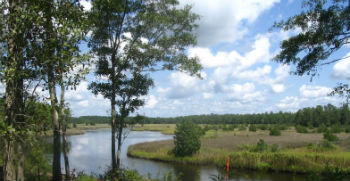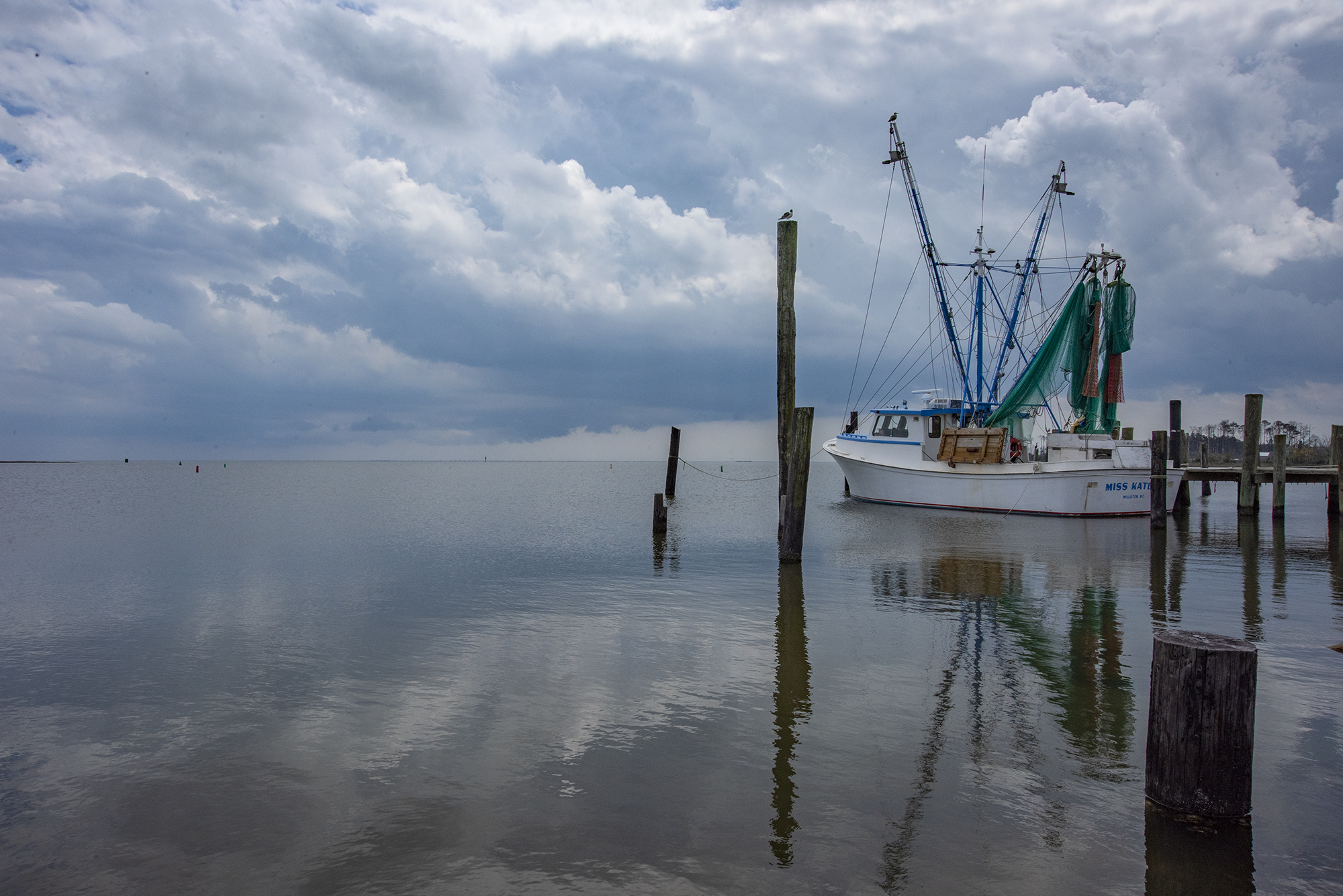Reprinted from the Tideland News
SWANSBORO — McDonald’s has received a state stormwater permit that exempts it from treating much of the stormwater from a proposed restaurant that will be in the watershed of creek already polluted by runoff.
The Wilmington Regional office of the N.C. Division of Water Quality issued the permit on Feb. 4. It exempts McDonald’s from meeting the full requirements of the state’s coastal stormwater rules under an exclusion contained in the rules for previously developed properties. McDonalds plans to build a restaurant on 1.4 acres on N.C. 24 in Swansboro that was once the site of a gas station and car wash.
Supporter Spotlight
The permit requires McDonald’s to treat stormwater from about 42 percent of the property. On that portion of the site, the company would have to contain the amount of runoff generated by 1.5 inches of rain in 24 hours.
That’s considerably less than what would have been required without the exemption. McDonald’s would then have to meet the strictest standards of the stormwater rules because the site drains to Queens Creek, which is considered High Quality Waters and a shellfish growing area. Those are among the highest water classifications in the state. Normally, new projects built in such watersheds along the central coast have to contain runoff generated by 3.5 inches of rain in 24 hours on the entire site.
The U.S. Environmental Protection Agency considers Queens Creek to be an “impaired” water body. Almost all of the creek, except for its lowest reaches, is permanently closed to shellfishing because of high bacteria levels from stormwater runoff. The rest of the creek temporarily closes to shellfishing after moderate rains. Under the federal Clean Water Act, the state is obligated to come up with plans to bring the creek back into compliance with water-quality standards.
That isn’t likely to happen if the state issues permits that exempts projects from regulations designed to control the very pollutant that’s causing the problem, noted Frank Tursi, a member of the Swansboro Planning Board and an assistant director of the N.C. Coastal Federation. He wonders, however, if the permit McDonald’s received is even legal.
 The upper reaches of Queens Creek are closed to shellfishing because of high bacteria levels from stormwater runoff. |
The current stormwater law, which the N.C. General Assembly passed in 2008, exempts new projects built on sites that are already developed. To qualify for the so-called “redevelopment” exemption, a new project can’t add more hard, constructed surfaces – parking lots, roof tops, driveways and other “impervious surfaces” that increase runoff– than already exists on the site. According the permit, McDonald plans to add 3,000 or 6,000 square feet of impervious surfaces – the permit’s numbers are a bit muddled as to the exact amount.
Supporter Spotlight
The stormwater law doesn’t extend the exemption to projects that exceed the hard-surface limit, Tursi noted. Neither has the state’s Environmental Management Commission passed rules that do so, he said.
Jim Gregson, regional supervisor for the surface water section in the state Division of Water Quality’s regional office in Wilmington, said earlier this year that the division makes a provision for the type of redevelopment proposed by McDonald’s. The exemption could be granted, “As long as they can treat anything that exceeds what was there before,” he said.
Gregson agreed that the stormwater rules enacted by the legislature “don’t specifically tell us to handle it that way.” But, he said, “That has always been our interpretation. I think it’s very fair to give someone credit if the site was already developed.”
Derb Carter, an attorney with the Southern Environmental Law Center in Chapel Hill, said he was perplexed by the division’s willingness to grant an exemption that doesn’t comply with state law.
“An internal policy (to do that) would in effect be rule-making,” he said. “You’re essentially making a rule without going through the required process, and the reason you have that process is so that everyone knows what the rules are.”
The legislature, Tursi said, apparently agrees. It passed a law, Senate Bill 810, last year that was signed by then Gov. Beverly Perdue. It appears to make permits based on division interpretations and guidelines illegal.
A section of the law reads: “This Article applies to an agency’s exercise of its authority to adopt a rule. A rule is not valid unless it is adopted in substantial compliance with this Article. An agency shall not seek to implement or enforce against any person a policy, guideline, or other interpretive statement that meets the definition of a rule contained in G.S. 150B-2(8a) if the policy, guideline, or other interpretive statement has not been adopted as a rule in accordance with this Article.”
McDonald’s should not have qualified for the stormwater exemption, Tursi said, because the amount of new impervious surface will exceed what was originally on the site. “But DWQ’s regional office in Wilmington allows such projects if stormwater from the additional square footage is treated,” he said. “That is a policy or guideline established by the agency. It appears nowhere in the 2008 stormwater law or resulting rules. According to the law passed last year it is therefore illegal. This could be the basis for a permit appeal if someone wanted to go that route.”
The permit could be challenged by anyone with “standing” in the matter. That generally means anyone who can show the court sufficient connection to and harm from the law or action challenged. Permit challenges are legal processes argued before a state administrative law judges.
Gregson acknowledged that Tursi is right about the rule, as written, but said the policy used by his office is normal and “common sense.”
“I don’t disagree that it is not specifically spelled out in the rule,” he said. “But say a developer is dealing with a project that is one square foot over what was there before. Do you then require him to do something totally different?”
What the office tries to do, Gregson said, “is be helpful to the development community” while ensuring that water quality is maintained.
In this case, he said, it’s true that the McDonald’s project will have about 3,000 square feet more impervious surface than the previous use on the property. But the permit does not totally exempt McDonald’s from stormwater management, and requires the developer treat a lot more stormwater than would have been required of the former user of the land.
“This is not an ‘exclusion,’” he said. “But we did give this developer credit for what was there before.”
Tursi said the whole issue could be put to rest if McDonald’s decided to simply do a few things, such as use pavers in the parking lot that allow rainwater to soak into the ground and design the required vegetated buffers to also serve as stormwater controls.
Other businesses in the area increasingly are taking those kinds of steps, he said, and they pay off not only in protection of surface waters, such as White Oak River, but also in good publicity in a world that puts more and more value on efforts to protect and natural enhance resources. In some cases, “green” solutions to storm water management actually save money in the long run, Tursi said.
The issue first arose in October, when McDonald’s representatives appeared before the Swansboro Planning Board and had no stormwater plan because they were proceeding under the assumption that the project would be exempt from state rules.
Planning board members weren’t pleased and suggested that McDonald’s rework the site plan to include some stormwater controls. The board a month later voted to recommend approval of the site plan after the developer added a vegetated retention area to capture some of the runoff.
The board is currently considering recommending to the town board a local ordinance that would require new projects that qualify for the state’s redevelopment exemption control stormwater to same level as any other project.
“We remake our landscape every couple of generations,” Tursi said. “If bodies of water like Queens Creek have any hope of meeting the high ideals of the Clean Water Act then redevelopment projects should be held to the same high standards as any other project.”







